|
All the world is a keyboard - Allah
Rakha Rahman is today's hottest musician both at home and abroad
by E
Vijayalakshmi, Chennai
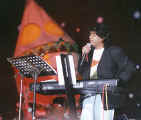 Cameras
whirred and flashlights popped as the A.R. Rahman sound track for
direc-tor Rajiv Menon's latest Tamil film Kandukondein Kandukondein was
released. But trouble was brewing in paradise as an ace lyricist of the
Tamil film industry rose to speak. "I agree wholeheartedly that
Rahman is a great composer," said Vairamuthu. "But I do wish
his music would not totally swamp my lyrics to the extent that nobody
can make them out." Cameras
whirred and flashlights popped as the A.R. Rahman sound track for
direc-tor Rajiv Menon's latest Tamil film Kandukondein Kandukondein was
released. But trouble was brewing in paradise as an ace lyricist of the
Tamil film industry rose to speak. "I agree wholeheartedly that
Rahman is a great composer," said Vairamuthu. "But I do wish
his music would not totally swamp my lyrics to the extent that nobody
can make them out."
I hate the discrimination between south, north, Tamil, Hindi. If I
represent India that is good enough for me. But we should cross all
these barriers.
A.R. Rahman
There was a collective gasp from the audience. And then indignation.
"In most cases it is Rahman's music which carries the film," a
veteran film journalist remarked. "And today's lyrics are hardly
worth listening to anyway. It was most rude on Vairamuthu's part to have
made that comment." Said director K. Balachander: "The present
generation is able to sing Rahman songs without any difficulty. That is
what is important."
And what was Rahman's reaction? As usual, a beatific smile and a barely
noticeable shrug. This boyish, podgy 33-year-old is as well-known for
his composure as for his explosive music.
Ever since his music career took off in 1992 to the lilting notes of
Mani Ratnam's hit film Roja, Rahman has weathered criticism of every
shade and colour. He was accused of being too technical, too modern, too
westernised, too repetitive, of lacking soul and even of plagiarism. He
beat back censure with studied silence; but it hardly signified
indifference.
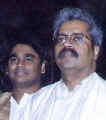 When
purists sneered at his first album with its soul-stirring Vande Mataram
track, Rahman was quick to point out that he never meant it to replace
the original. Critics who overemphasised his western leanings were
silenced when he delivered songs in the Carnatic genre. Even today, the
Ennavale... number from Kaadalan is considered a masterpiece. More
recently, Mudhalvan showcased the perfect ease with which Rahman mixed
the traditional and the modern. If Azhagana Rakshsiye used the
Reethigaulai raga, Shakalaka baby... set many a foot tapping. When
purists sneered at his first album with its soul-stirring Vande Mataram
track, Rahman was quick to point out that he never meant it to replace
the original. Critics who overemphasised his western leanings were
silenced when he delivered songs in the Carnatic genre. Even today, the
Ennavale... number from Kaadalan is considered a masterpiece. More
recently, Mudhalvan showcased the perfect ease with which Rahman mixed
the traditional and the modern. If Azhagana Rakshsiye used the
Reethigaulai raga, Shakalaka baby... set many a foot tapping.
His strength is the way he designs sound. He has revolutionised film
music. He is perpetually on a quest to get the best out of you and makes
you feel at ease which is important. I have sung some of my best songs
for him.
Hariharan, singer
Perhaps the only criticism which has stuck is that he is
"slow". As Rahman himself admits, sometimes it is just a
matter of days and sometimes months for inspiration to strike. Industry
sources recall how Bharathiraja's film Kizhakku Cheemayile was held up
because Rahman's music was not ready in time.
Rahman
was initiated into the world of films while still a toddler named Dilip
Kumar. His earliest memories are of tagging along to studios with his
father R.K. Sekhar, an assistant music director in Malayalam films. Once
a music director overheard the four-year-old trying out a tune on a
harmonium. He quickly spread a cloth over the keys. Undaunted, the child
repeated the tune, this time running his fingers confidently over the
cloth. "Who would have thought then that he would scale such
heights?" said film chronicler 'Filmnews' Anandan, who knew Rahman
as a gawky youngster.
Ironically, Rahman had never been interested in a career in the film
industry. His father's illness and death, however, forced him to drop
out of the Madras Christian College School while in the XI standard, and
fend for the family. He began by working in studio jam sessions and then
migrated to the ad world. He composed jingles for 300 commercials
including the Allywn Trendy watch and Kapil Dev-Sachin Tendulkar Boost
campaign.
 East
meets west: (From top) Guitarist Dominic Miller, Kanika Bala and Rahman East
meets west: (From top) Guitarist Dominic Miller, Kanika Bala and Rahman
He returned to film music when in 1987 Viji Manuel, the main keyboard
player for music composer Ilayaraja, hired him. Rahman picked up
computer music programming and put together the first Tamil computer
song, Punnigai Mannan, for Ilayaraja. Today he may have eclipsed his
one-time master, but Rahman's respect for the composer runs deep. For,
it was under Ilayaraja's strict guidance that he learnt the virtue of
discipline.
Over the years, constant comparisons with Ilayaraja have been the bane
of Rahman's career. Although nobody denies Ilayaraja's arrogant genius,
Rahman's arrival on the scene "is like the idea whose time has
come," said Anandan. "After M.S. Viswanathan, came Ilayaraja,
then Devaa and now Rahman. It is nature. The cycle has to keep
going."
Among the many who obviously shared the view was Mani Ratnam. Like
veteran film-makers Bharathiraja and K. Balachander, he had been an
Ilayaraja regular until he chanced upon Rahman. The story goes that
Rahman approached the director with an invitation to visit his recording
studio—the Panchathan Record Inn—at his house in Kodambakkam.
Six months, later Mani Ratnam was scouting round for fresh talent for
his film Roja and remembered Rahman. He also recalled that his cousin
Sharada, of Trish Productions, had raved about Rahman's talent after
hiring him for a few jingles including the Leo coffee ad. The rest was
history. "I must have listened to Roja a dozen times," said
Hindi film director Govind Nihalani. It later prompted him to sign
Rahman for his first commercial venture Thakshak.
Roja was as much a turning point for Mani Ratnam as for Rahman, who
received the national and state award for best music director for the
film. Mani Ratnam, who had hitherto failed to make an impact in the
north, now found that with Rahman's radical music his films were making
Bollywood sit up and take notice. Thiruda Thiruda, Bombay and Dil Se
took the duo deeper into the north.
Bollywood came a calling at Rahman's studio, probably the most
sophisticated in India. Beginning with Ram Gopal Verma's Rangeela,
Rahman churned out one chartbuster after another.
Soon it was not just India which was dancing to his tune. When Rahman
released his first album, Maa Tujhe Salaam, Sony Music Entertainment
signed him in a trice and marketed it in 20 countries. In 1999, king of
pop Michael Jackson shared the stage with Rahman at a concert in Munich,
Germany, and crooned Ekam Satyam (One Truth) with him.
A year later Rahman has touched a new high. World renowned composer Sir
Andrew Lloyd Webber, enthralled by Rahman's Dil Se and Taal score—the
latter entered the UK top 20—suggested that director Shekhar Kapur and
they work together on a musical titled Bombay Dreams. At a party in
Mumbai to launch the project, Webber and Rahman played the song Chaiyya
Chaiyya from Dil Se on the piano.
"His music has that international quality which is absolutely
stunning," said Douchan Gersi, director of The Return of the Thief
of Baghdad, a Chiranjeevi starrer to be shot in English. Step by step,
Rahman is achieving his ultimate goal, "promoting Indian music in
the western world". These are also opportunities for the composer
to save himself from writing music for masala movies, and give free rein
to his creativity.
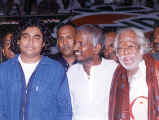 When
the maestros met: (Left to right) Rahman with Ilayaraja and music
director M.S. Viswanathan When
the maestros met: (Left to right) Rahman with Ilayaraja and music
director M.S. Viswanathan
In January President K.R. Narayanan released Rahman's second album, Jana
Gana Mana 2000, to mark 50 years of the Indian republic. The albums have
brought out the best in Rahman. Produced by school chum Bharat Bala and
his wife Kanika, they have almost transformed him into a pop icon of
Indian patriotism.
It is exciting times ahead on the film beat too. Having completed work
on Mani Ratnam's Alai Payudhe, Rahman is moving on to Shyam Benegal's
Zubeida, Khalid Mohammed's Fizaa, and the Tamil comedy Tenaali featuring
Kamal Hasan.
Fortunately Rahman doesn't suffer from ego vertigo at the dizzying
heights of popularity. He has his feet on the ground, and steadying him
constantly are his family and faith.
In 1990, when his sister fell ill, the family turned to a pir, Karimulla
Shah Kadri. The girl's almost miraculous recovery led to the family's
conversion to Islam. Although Rahman prefers not to wear his religion on
his sleeve, there is ample proof of its primacy in his life. His studio
is decked with Islamic icons and symbols and he wears a chain with an
inscribed locket round his neck. On his trip to Delhi to receive the
Padma Shri, he offered namaaz at the Hazrath Nizamuddin Dargah. In 1995,
his mother chose Saira Banu as his bride. The couple have two daughters.
Rahman zealously guards his privacy. His house is protected from prying
eyes by an imposing gate and guests are ushered through a side gate into
a small and austere office. Ask him to pose for a photograph in his
well-manicured lawn, and he very politely but firmly shakes his head.
"He just wants to be left alone with his music," said James
Noell, a long-time aide. He would rather the hype and hoopla surrounded
his music than his persona.
But his shy demeanour hides a generous heart. Associates remember him
stopping at a busy Mumbai intersection to give alms to beggars lining
the street. "He just thrust his hand into his pockets and gave them
all the money," said one. Another time in Chennai he got out of his
car to help a cyclist who lay in an epileptic seizure.
Despite global acclaim, Rahman will always remain a Chennai boy at
heart. Recently he dispelled rumours that he was planning to settle
abroad. "How can I leave? It is only my work which takes me to
other places." Yes, his work and his fame.
He's
divine and simple - by
Subhash Ghai
Rahman
has a strange kind of spirituality within which he lives. I worked with
him for 58 nights for Taal and he would compose music from 10 p.m. to 8
a.m. He knows technique, has a rare sense of sound and a great ear. He
can make any besura (tuneless) voice sing well. This is obvious from
singers who have sung beautifully for his albums but have not done well
later.
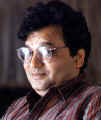 He
has a sharp intellect and understands not just the sound of music and
quality of voice but also the market forces and how to move from post to
post. That is the need of the hour. I have had the opportunity of
working with Pyarelal, one of the greatest composers of India, but he
had no understanding of the market. He
has a sharp intellect and understands not just the sound of music and
quality of voice but also the market forces and how to move from post to
post. That is the need of the hour. I have had the opportunity of
working with Pyarelal, one of the greatest composers of India, but he
had no understanding of the market.
After Roja I was the first Hindi film director to approach him with a
project in 1994. It was for Shikhar—with Jackie Shroff and Shah Rukh
Khan—which unfortunately did not materialise. When I met him for the
first time I found him so divine and so simple. "Let us work first,
then we'll talk about money," he told me then. It is strange now
that he is the highest-paid music director in the history of the Indian
music industry!
He has brought a new sound to the advertising and film industry, and he
will do the same for theatre now. His project, Bombay Dreams, with Sir
Andrew Lloyd Webber, is definitely going to promote him as a new musical
response from India. Very soon he will be known as an international
composer as good as Yanni or better than him. I'm confident he can do
it.
I love him both as a composer and as a friend. He is very sweet to talk
to. The only thing is you talk and he listens! (Laughs.)
(As told to Maria Abraham)
Techno-brat
seeking soul -
S.
Sreedhar, who won the national award for sound engineering in Dil Se,
talks about the Rahman he knows
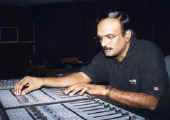 I
had known Rahman many years before I started working with him on Roja.
While he was doing jingles, we would often meet and compare notes on
music trends and synthesisers. I
had known Rahman many years before I started working with him on Roja.
While he was doing jingles, we would often meet and compare notes on
music trends and synthesisers.
Rahman's biggest asset is that he treats each song as his first song. He
prays before each session. I believe there is some power in his God,
faith and religion. I can give you countless examples when he became so
inspired after his prayers.
When we were working on Bombay, the mixing was being held up since the
background score was not ready. For three days, Rahman sat in his studio
from 5 p.m. to 9 p.m., but nothing would work. He needed to deliver a
score which would bind the film, but was having a creative block. There
was some tension. He tried fiddling around with the theme he had
composed, but nothing worked. So we would sit and chat for hours about
things other than music.
We decided not to work on the fourth day. At 10 p.m. he invited me over
to his place. We sat chatting again, but this time I felt there was
something which had not been there on the other days. He said,
"Let's go into the studio." The theme was played again. He
said, "Let's put lyrics into it and let's have a song." That
was absolutely brilliant. We had a lyrical rendition of the background
score. Rahman must have been truly inspired to do that.
He is very open-minded about what a song needs and gives each song a
completely individual taste. It is the way he soothes you into a song
that I call his signature. There is a visual texture in his mind when he
composes music. When you see the song picturised you can immediately
connect. The Dil hai, Bechain hai song in Taal is a perfect example of
this. Even as you hear it, the scene unfolds in front of you—the fog
lifting, the girl appearing....
I remember another instance connected with Bombay. We had recorded
Hariharan for the Uyire song picturised on Arvind Swamy and I was mixing
it. As we had used a lot of electronics, I was cleaning up the track of
all breathing sounds and 'dirt'. When Rahman heard it, the first thing
he said was, "There is something missing." I told him about my
cleaning exercise and he said, "What the song needs is a lot of
air." So I put all the 'dirt' back, and truly the song had much
more life especially since it was picturised against the beautiful forts
and sea. With my cleaning I had taken the life out of the song! Even now
I get goose bumps when I think about it.
Rahman allows musicians to be themselves. He understands their soul. He
also has a fabulous way of getting notes out of a musician without
telling them in so many words. Time and again I have heard him ask a
singer, "Why isn't there pain in your voice?" and
instinctively the singer understands what he is referring to.
Rahman and I have a fine understanding; I may not be with him when he is
composing a song, sometimes in the middle of the night. When he puts on
his headphones and seems deep in concentration, I know I should leave
him alone. Otherwise, we keep dabbling, fiddling, ripping apart every
instrument we get! We experiment with new sounds; he has a thirst for
creating new rhythm tracks. We ask questions like, "Why can't a
sitarist play with a rock guitar," or "Why can't a jazz guitar
be teamed with the south Indian violin?" His search is endless.
Rahman never ceases to amaze me. He is such a fine musician apart from
being a music director; his strength is fusion. He is also a
techno-junkie. If you give him a set of headphones he will most probably
rip it apart to understand why it works so well! I sometimes say that we
are techno-brats. But Rahman knows that a song shouldn't speak the
technical language but should have soul.
Rahman is humble and very generous with money. He hates to see people
suffer. I think his philosophy is that people should derive happiness
from his music, even if it is a sad tune. He has this tremendous need to
be perfect. Of course, we also differ in our views; I criticise his
music if I feel it lacks his signature and this irritates him sometimes.
[E.
Vijayalakshmi, the week]
|